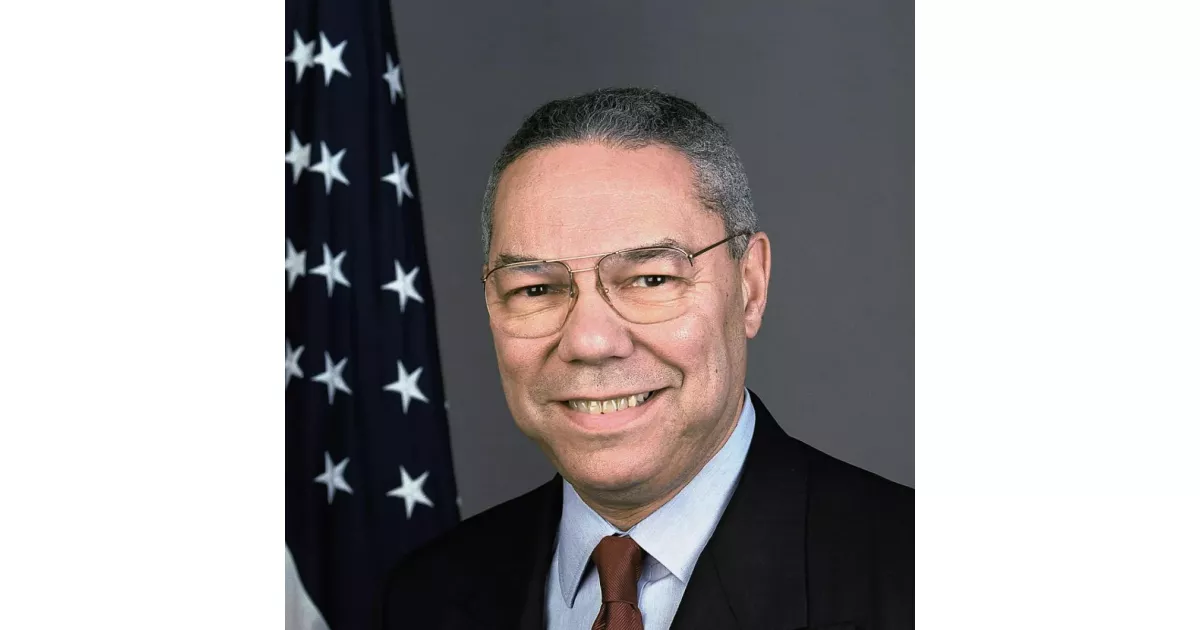Controversies are a part of history. Explore the biggest scandals linked to Colin Powell.
Colin Powell (1937-2021) was a prominent American statesman and four-star general. He served as the 65th U.S. Secretary of State (2001-2005), the first African American to hold that position. Previously, he was National Security Advisor (1987-1989) and Chairman of the Joint Chiefs of Staff (1989-1993), the highest-ranking military officer in the U.S. Armed Forces. Powell's career was marked by his involvement in major foreign policy decisions and military operations from the Reagan to the George W. Bush administrations, though his presentation to the UN Security Council in 2003 regarding Iraq's alleged weapons of mass destruction remains controversial.
1968: My Lai Massacre Investigation
In 1968, Colin Powell investigated a letter alleging the My Lai massacre. His assessment was later criticized as a whitewash.
1973: U.S. Support for Chilean Coup d'état
In 1973, Powell was critical of U.S. foreign policy regarding its support for the Chilean coup d'état that deposed Salvador Allende.
2001: Disagreement on Action Against al-Qaeda
In 2001, before 9/11, Richard A. Clarke pushed the Bush administration for action against al-Qaeda in Afghanistan, a move opposed by Paul Wolfowitz.
February 2003: Address to the United Nations Security Council
In February 2003, Powell addressed the United Nations Security Council, arguing in favor of military action against Iraq, asserting that Saddam Hussein had biological weapons and was working to obtain key components to produce nuclear weapons.
2003: Controversy Surrounding UN Speech and Faulty Intelligence
In 2003, Intense debate went on behind the scenes regarding what to include in Powell's speech. Claims based on faulty intelligence, such as the yellowcake forgery, were left in the speech. The administration faced criticism for acting on faulty intelligence, particularly that which was single-sourced to the informant known as Curveball.
2003: Attribution of Iraq War to Neoconservative Beliefs
In 2003, Powell attributed the decision to go to war in Iraq to the neoconservative belief that regime change in Baghdad was a necessary stop on the road to peace in Jerusalem.
2003: Role in Building the Case for the 2003 Invasion of Iraq
In 2003, Powell played a role in building the case for the invasion of Iraq.
2003: Comments on the 1973 Chilean Coup
In 2003, Powell stated that the U.S. support for the 1973 Chilean coup d'état was not a part of American history that the United States is proud of.
May 2004: Comments on My Lai
In May 2004, Colin Powell commented on the My Lai massacre to Larry King, stating that such horrible things happen in war but are still to be deplored.
September 2004: Powell Describes Darfur Events as Genocide
In September 2004, Colin Powell labeled the events in Darfur as "genocide," making him the first cabinet member to use the term for an ongoing conflict.
September 2004: Testimony Before Senate Committee
In September 2004, Powell testified before the Senate Governmental Affairs Committee, acknowledging that the sources who provided much of the information in his February 2003 UN presentation were "wrong" and that it was "unlikely" that any stockpiles of WMDs would be found.
2004: Comments on Neoconservatives
In 2004, Colin Powell reportedly referred to neoconservatives within the Bush administration as "fucking crazies" in a conversation with British Foreign Secretary Jack Straw.
2004: Inaccurate Evidence for Weapons of Mass Destruction
In 2004, a report concluded that the evidence Powell offered to support the allegation that the Iraqi government possessed weapons of mass destruction (WMDs) was inaccurate.
April 2005: Accusations of Campaign Against Bolton
On April 28, 2005, an opinion piece claimed that Powell was "conducting a campaign" against Bolton due to past disagreements, including Bolton allegedly spying on Powell.
September 2005: Criticizes Response to Hurricane Katrina
In September 2005, Colin Powell criticized the response to Hurricane Katrina, suggesting that thousands of people, primarily the poor, were not adequately protected.
September 2005: Regret over UN Speech
In September 2005, during an interview, Powell referred to his 2003 UN speech as a "blot" on his record, expressing pain and regret.
September 2006: Sides with Senate Republicans on Detainee Rights
In September 2006, Colin Powell sided with moderate Senate Republicans, supporting more rights for detainees and opposing President Bush's terrorism bill, expressing concerns about the moral basis of the fight against terrorism.
September 2006: Expresses Opposition to Military Tribunals
In a September 2006 letter to John McCain, Colin Powell voiced his opposition to President Bush's push for military tribunals of enemy combatants, objecting to redefining Common Article 3 of the Geneva Convention.
2007: Concerns about Accusations Against Jewish Groups
In 2007, An article expressed fears that Jewish groups would be accused of driving America into a war with Iran and quoted JINSA's executive director as "surprised" Powell "would single out a Jewish group when naming those who supported the war".
2012: Powell comments on Benghazi attack controversy
In 2012, commenting on the Benghazi attack controversy surrounding Hillary Clinton, Powell told then U.S. Ambassador Susan Rice, "Benghazi is a stupid witch hunt".
2013: Questions Arise Regarding Email Relationship with Romanian Diplomat
In 2013, Powell faced questions regarding his relationship with Romanian diplomat Corina Crețu after a hacked AOL email account was made public, he acknowledged a "very personal" email relationship but denied further involvement.
October 2015: Warns of Republican Party Move to the Fringe Right
Speaking at a Washington Ideas forum in early October 2015, Colin Powell warned that the Republican Party had begun a move to the fringe right, lessening the chances of a Republican White House in the future. He also remarked on Republican presidential candidate Donald Trump's statements regarding immigrants.
March 2016: Denounces Nastiness of Republican Primaries
In March 2016, Colin Powell denounced the "nastiness" of the 2016 Republican primaries during an interview, comparing the race to reality television.
August 2016: Accuses Clinton Campaign of Pinning Email Controversy on Him
In August 2016, Colin Powell accused the Hillary Clinton campaign of trying to pin her email controversy on him, clarifying that she was using the private email server before he advised her on his own practices.
September 2016: Powell's Private Email Communications Revealed
In September 2016, private emails were obtained revealing Powell's communications regarding Donald Trump and Hillary Clinton, where he criticized Clinton's handling of her email scandal and the Benghazi attack controversy, stating that "Benghazi is a stupid witch hunt".
October 2019: Powell Warns GOP to Stand up to Trump
In October 2019, Powell warned that the GOP needed to "get a grip" and put the country before their party, standing up to then-president Trump rather than worrying about political fallout, citing concerns about the state of foreign policy.
2021: Recants Republican Status
In 2021, Colin Powell recanted his status as a Republican following the storming of the United States Capitol on January 6th.
Mentioned in this timeline

Donald John Trump is an American politician media personality and...

Bill Clinton served as the nd U S President from...

Barack Obama the th U S President - was the...

Hillary Diane Rodham Clinton is a prominent American politician lawyer...

George W Bush the rd U S President - is...

Joe Biden is an American politician who served as the...
Trending

50 minutes ago Mbappé Suffers Knee Sprain, No Surgery Expected: Real Madrid Medical Report
50 minutes ago VTI ETF Experiences Outflows Amidst AI Volatility: A Market Overview

51 minutes ago QQQ Down Amid STX Stock Price Drop: A Market Analysis
51 minutes ago Dow Plunges Amid Iran War Fears, Oil Spikes: Market Tensions Rise

51 minutes ago Rodrygo suffers serious injury, out for season and World Cup; knee exploration

2 hours ago Christa Miller shares Scrubs revival update, Jordan's reveal in new production.
Popular

Jesse Jackson is an American civil rights activist politician and...

Hillary Diane Rodham Clinton is a prominent American politician lawyer...

Jim Carrey is a Canadian-American actor and comedian celebrated for...

XXXTentacion born Jahseh Dwayne Ricardo Onfroy was a controversial yet...

Ken Paxton is an American politician and lawyer serving as...

Michael Joseph Jackson the King of Pop was a highly...
